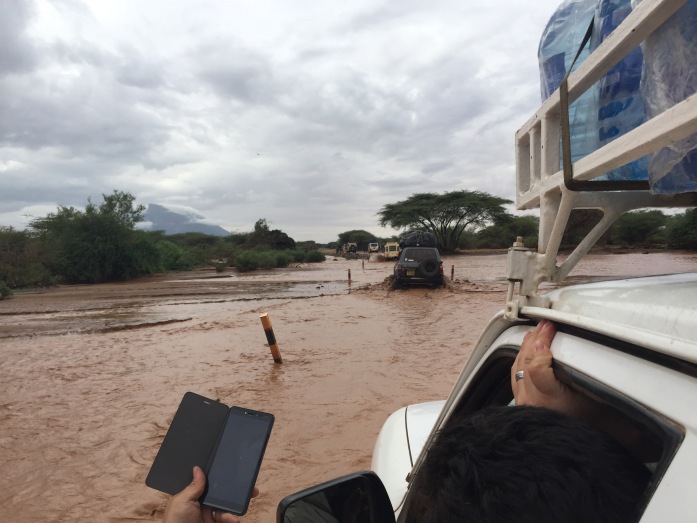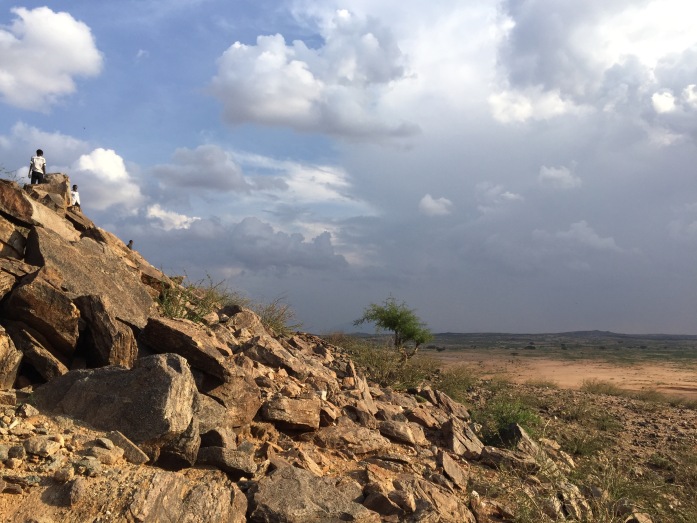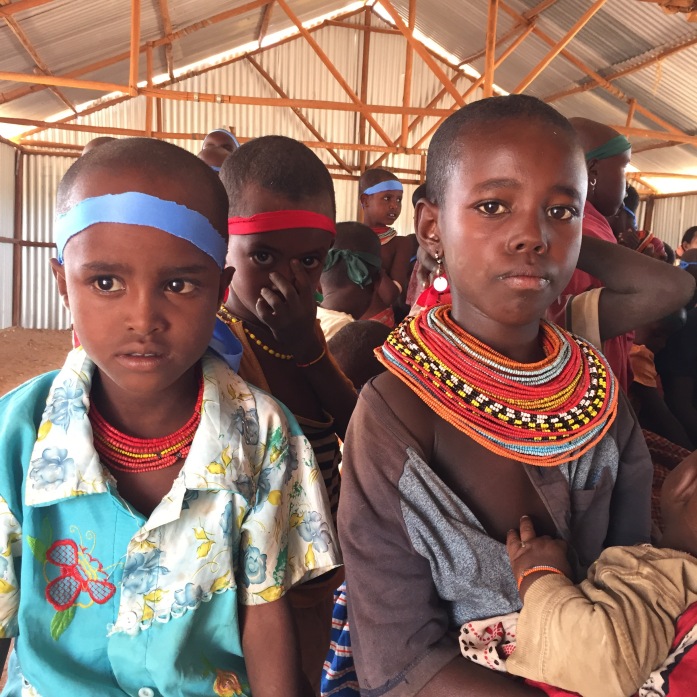– Arrival. It wasn’t that I spent half the ride crammed in the back of a 4 x 4. It wasn’t that the dirt roads were bumpy. It wasn’t even that one of our vans got stuck in the mud and had to be winched out. It was that departure had been delayed several hours in the morning, and I hadn’t eaten since breakfast, so it had been about 10 hours since my last meal. The whole team was really hungry, and the sun had gone down by the time they got our dinner to us. It consisted, if I’m not mistaken, of rice and a stew with carrots, a few potatoes, and goat meat. I was so grateful for their hospitality, let me say first, but even as hungry as I was, there wasn’t a ton of it to go around between 30 African ministers and 10 wazungu (white folks).
 Of the virtues of goatmeat, I will say but little (as the saying goes, if you don’t have anything nice to say, don’t say anything at all). Then, the next morning, I was so concerned there would be nothing to eat. What if it was nothing but oranges, of which the local variety actually tend to be green and full of seeds? I still felt a little bit of the tiredness and hunger pangs from the day before, but my fear was turned to joy when I saw menendazi! Oh, glory, fried carbs! My inner westerner rejoiced. It’s a decently common dish in this country, kind of like a triangle-shaped doughnut with no glaze. With the tea they served alongside it (black tea with enough sugar and milk in it nearly to pass as sweetened condensed milk), it was a pretty good substitute for a coffeehouse breakfast.
Of the virtues of goatmeat, I will say but little (as the saying goes, if you don’t have anything nice to say, don’t say anything at all). Then, the next morning, I was so concerned there would be nothing to eat. What if it was nothing but oranges, of which the local variety actually tend to be green and full of seeds? I still felt a little bit of the tiredness and hunger pangs from the day before, but my fear was turned to joy when I saw menendazi! Oh, glory, fried carbs! My inner westerner rejoiced. It’s a decently common dish in this country, kind of like a triangle-shaped doughnut with no glaze. With the tea they served alongside it (black tea with enough sugar and milk in it nearly to pass as sweetened condensed milk), it was a pretty good substitute for a coffeehouse breakfast.

– Situation. I’ve gotten a little bit ahead of myself. Let me explain the situation. The entire school of African ministry students, its directors, and our short-term team went to a community known as Korr in one of the tribal areas. It’s a place so isolated that nearly everyone in this country I asked had never heard of it, a rugged and elemental place where families live in huts and men still walk around in brightly colored wrap-skirts. A long-term minister there had invited us to come and do some discipleship as well as help him plant a new church in a community that did not have one. Including transit, we spent about six days on the trip.

– Location. Our off-road vehicles departed where we slept that night and eventually arrived at a sheet metal pavilion. It was a gathering area for the small church community there. Adjoining it was a small building, serving normally as the preschool, soon to be school, now having been converted to our quarters, and about 100 yards away, the church building, in which we did kids ministry.

– Children. This first morning, my task was to serve in the children’s ministry. Before long after our morning devotion, mothers and children begin filtering in, and soon the room was filled with about 40 curious indigenous kids. Language was a huge barrier, and we only had about one translator. Separating the kids into teams would’ve been difficult, so my innovative teammates had colored strips of cloth cut–some red, some blue, and a few green–and we help tie them around each child’s head sort of like a bandanna. We did our best to play a few simple games with them, a song or two, and a Bible story. The time proved to be little bit chaotic and spur of the moment, but in the end was enjoyable. The children seemed quite cautious at first, then got hyperactive toward the end. Several go-getters, including a few boys, were really getting into it. Many of the girls were also engaged but a little more reserved in activity, since the girls closer to the age of 10 already start taking care of their younger siblings, toting their infant brothers or sisters on their hips or even wrapping them on their back in the indigenous style. I also saw just about every human emotion in the faces of those children, including a lot of terrified, irritated, and sad crying babies.

– Kitchen duty. Once we finished, I headed back to the pavilion to help with my cooking duties. The kitchen outside was a collection of sticks built up in an igloo-like shape which was covered with small-leaved limbs, cardboard, and fabric. It was an ingenious shelter against the wind and sun. Outside were two large pots for cooking set on large stones with fires beneath. They needed me to help chop vegetables. Dicing green bell peppers was a delight, as it was one of the few things I was familiar with.

– Next I met Patrick. He’s the resident minister, originally from the more reached southwestern part of the country, who moved here to plant churches among the tribal communities. With a welcoming demeanor, a generous beard, a penchant for oratory, and a laugh that could light up a moonless night, he was quite a joy to get to know. He offered me tea from a faded small, yellow bucket that looked like the only thing that should have belonged in it was fishbait. I’ve learned, though, not to be too recalcitrant based on presentation in this part of the world, and I quickly learned it did not affect the taste in the slightest.
– Outreach. In the afternoon, we did some outreach. I was elated to learn one of our shyest team members had gotten her first public speaking opportunity in Africa as she presented to a group of 50 to 75 women and children. I say opportunity, but perhaps a better description would be that she was thrown into it without consent by the African ministry students around her. In the end, it was the Lord, not any of us pressuring her or persuading her. Overcoming fears, regardless of the means, is a wonderful achievement. The audience in one of the isolated communities was highly responsive to her message. I was amazed at the eagerness and openness of the people. We then were invited to have tea, yet again, in one of the huts. Crouching low, we entered into the stick, skin, and fabric structure. A couple of kids were tied up under one of the benches, chewing on some rope. Baby goats, properly, I mean. Don’t worry; there were no children tied up or eating trash. My teammate had never seen any before, so it was a special day for her. I was surprised at the distinct smell of goats even permeated the tea which we were served. Even so, I was grateful. The hospitality of these people is astounding.
– John’s miracle story. He was preaching to the men’s group, he was requested by one of the members to take a man with chronic pain to the hospital. The man had been in a car accident several months earlier during a revisit to the big city. John and his wife Mercedes couldn’t take the man to the hospital as he requested, so they went and prayed for him. The man had a believing wife but he had never given his heart to Christ. After the first prayer, the amount of pain decreased a little bit. After the second time, it was discernibly all gone. The man had a distinct look of surprise in his eyes. Could he really be healed? I wish I had been there to see it. He gave his life to the Lord then and there, no more questions asked. Why the sudden shift? In such a culture where life is navigated not along the innocence-guilt dichotomy of the west nor the honor-shame continuum of the east, but rather the fear-power spectrum often seen in primitive animistic societies, such a display of supernatural power lends solid credibility to a message. The next day when they went to see him, they couldn’t find him (which is actually a good thing when you’re dealing with someone who was immobilized by chronic pain). To their surprise and joy, he had gotten up and was walking about.

– After debrief and dinner, it was back to bed for me. I was sleeping in the church building which we had used for children’s ministry earlier. To get to it from the pavilion/kitchen, there was a walk of a couple hundred yards over flat land. The ground was made of an orange dirt with intermittent low-rising shrubs, some of which had long thorns. Broken quartz stones and parts of goat skeletons could be found everywhere. The church itself was a one room structure about 25′ x 35′. The walls and ceiling were made of the gray sheet metal common in African structures. There was one door at a corner, just an opening, and two white slits for windows that were about 3′ x 20′ opposite one another along the longer walls. The ground was dirt over a concrete foundation, and the inner scaffolding was made of thick wooden sticks. We slept on foam mats about 2 inches thick, and I had chosen to bring along with me a few luxuries, as it were, a pillow and some cheap sheets.
– In the end, lying on my back journaling and hoping no disturbingly obese spiders or diabolical scorpions crawled near my head, I was actually thinking about how not epic nor heroic this was. Traveling to the middle of nowhere and going without material comfort for days at a time… Even atheists will do that from time to time and call it camping.
– In the stark and raw places of the earth, though, the Bible came so much more alive. Even traveling to the ends of the earth and bringing no money or food with me… even doing that though, I’m still not to the level of what was done by Jesus. At least I had a pillow and a 2 inch thick plastic mattress to lay down on. The Son of Man had nowhere to lay his head. That’s doing it really like Jesus. He’s the real hero of the story.
Mark 10:45
“For even the Son of Man did not come to be served, but to serve, and to give his life as a ransom for many.”
Stay suspensefully vigilant for the celebrated part two.
